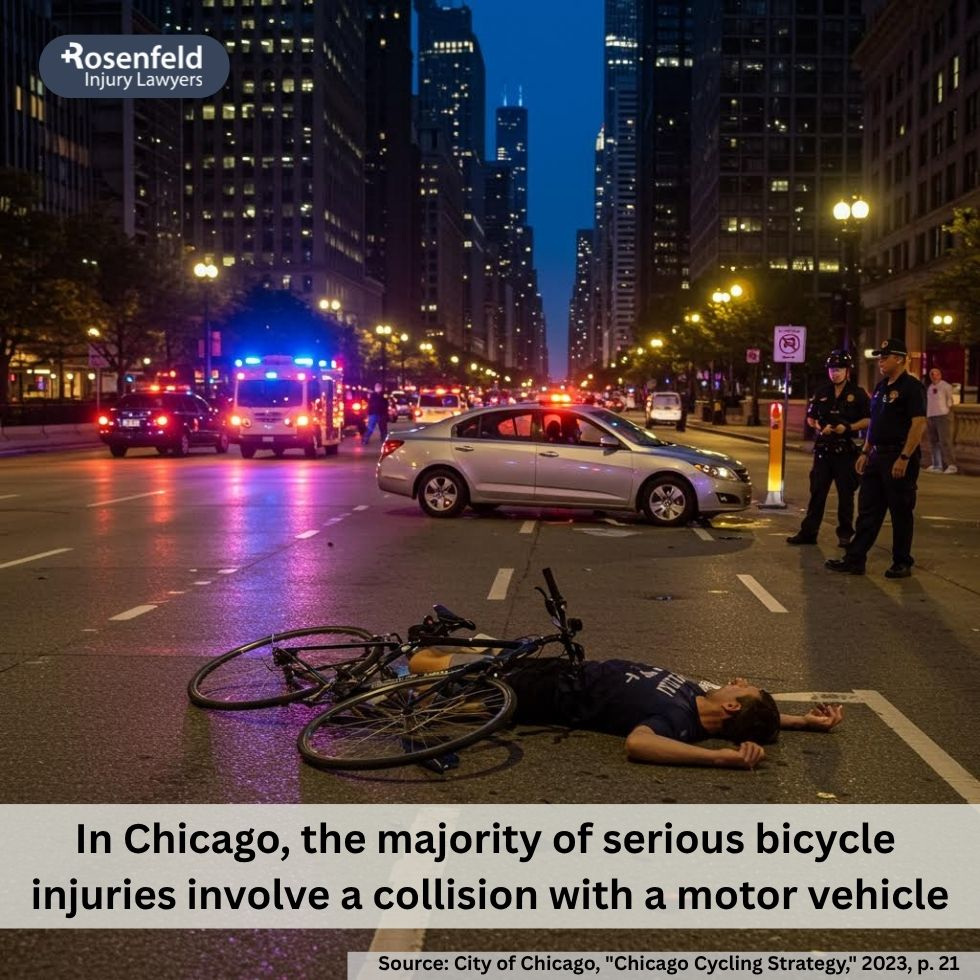- 24/7 Free Consultation: (888) 424-5757 Tap Here To Call Us
Chicago Car Vs. Bicycle Accident Lawyer

Guiding Chicago Cyclists Through the Legal Process After a Collision With a Car
Our Chicago car vs. bicycle accident lawyers fight for injured cyclists who have been hit by negligent drivers. With little protection against vehicles, bicyclists often suffer severe injuries and costly medical bills.
If you were struck by a car while riding in Chicago, an experienced attorney from Rosenfeld Injury Lawyers can help you pursue compensation for your losses. Some of our settlements recovered in bicycle accident cases include:
- $2,250,000 for a commuter who suffered a serious head injury after being struck by a vehicle while biking to work in Chicago.
- $1,000,000 for a 26-year-old cyclist who sustained a torn rotator cuff after a driver unlawfully opened a car door in her path, violating Chicago traffic laws.
- $760,000 for a cyclist stopped at a traffic light was struck from behind by a driver who blamed poor lighting for the crash.
Common Causes of Car vs. Bicycle Accidents
Bicycle crashes often happen because drivers fail to see or respect cyclists. Common causes of bike crashes include:
- Distracted driving;
- Failure to yield;
- Dooring accidents;
- Right-hook and left-hook accidents;
- Speeding or reckless driving;
- Impaired driving;
- Unsafe passing or tailgating;
- Road hazards.
Common Injuries in Car vs. Bike Crashes
Unlike drivers, cyclists have little protection in a bike crash, making these accidents especially dangerous. Common injuries include:
- Head injuries – Concussions and traumatic brain injuries from impact.
- Broken bones – Fractures in the arms, legs, ribs, or collarbone.
- Spinal cord injuries – Can lead to paralysis or long-term mobility issues.
- Road rash and lacerations – Severe skin abrasions from sliding on pavement.
- Internal injuries – Organ damage and internal bleeding requiring urgent medical attention.
- Soft tissue injuries – Sprains, torn ligaments, and muscle damage.

Determining Liability in Chicago Car vs. Bicycle Collisions
Establishing fault in a bicycle accident is key to a successful personal injury claim. Most cases rely on proving negligence, meaning the driver failed to exercise reasonable care.
The Illinois Rules of the Road and Chicago traffic laws require drivers to obey traffic signals, yield to cyclists in a bike lane, and check for bikes before opening car doors. Potential defendants could include a driver, an employer (if a commercial vehicle was involved), or even the city (for hazardous road conditions).
Under comparative negligence (735 ILCS 5/2-1116), injured cyclists can still recover damages if they are less than 50% at fault, though their percentage of fault reduces compensation.
Steps to Take After a Bicycle vs. Car Accident in Chicago
Taking the right steps after a bike crash can protect your health and legal rights:
- Prioritize safety and seek immediate medical attention.
- Call 911 and report the accident to the Chicago police.
- Exchange information with the driver. Get their name, contact details, and insurance coverage information.
- Document the accident scene. Take photos and videos and gather witness information.
- Preserve evidence. Keep your bicycle, helmet, and clothing.
- Keep detailed records of medical expenses, lost income, and ongoing treatment.
- Do not admit fault or discuss the accident with insurance companies without legal advice.
Filing a Lawsuit for a Chicago Bike Accident
If you’ve suffered serious injuries in a bike collision, filing a personal injury lawsuit may be the best way to recover compensation. The legal process includes:
- Consulting with a lawyer – An attorney will evaluate your case, explain your legal rights, and determine the best strategy.
- Investigating the accident and gathering evidence – Your lawyer will collect police reports, witness statements, traffic camera footage, and medical records to establish liability.
- Filing a lawsuit in Illinois courts – If negotiations with the insurance company fail, your attorney will formally file a claim.
- The discovery process – Both sides exchange evidence, including accident details, medical records, and expert testimony.
- Negotiating a settlement – Many bicycle accident cases are resolved before trial through settlement discussions.
- Going to trial – If a fair settlement isn’t reached, your attorney will present your case in court to seek full compensation for medical expenses, lost income, and pain and suffering.
Statute of Limitations for Car vs. Bike Collision Claims in Illinois
Per 735 ILCS 5/13-202, cyclists generally have two years from the date of the bike accident to file a personal injury claim in Illinois. The deadline may be shorter if the claim is against a government entity.
Why You Need an Experienced Attorney
Hiring a bicycle vs car accident lawyer can significantly impact your case. An attorney ensures you understand Illinois traffic laws and bicycle regulations, proving the driver’s negligence in violating bike lane and traffic signal rules.
An attorney negotiates with insurance companies and defense lawyers for fair compensation, considering medical bills, lost wages, and pain and suffering.
Throughout the legal process, an experienced attorney will protect your rights, gather evidence, and build a strong case to secure the best possible outcome for victims.
Consult a Chicago Car vs. Bicycle Accident Attorney Near You!

If you were injured in a car vs bicycle accident, Rosenfeld Injury Lawyers is here to help. Our experienced Chicago bicycle accident lawyers fight for injured cyclists, ensuring they receive full compensation.
We work on a contingency fee basis, meaning you pay nothing unless we win your case. Call us at (888) 424–5757 or fill out our contact form to schedule a free consultation.
All content undergoes thorough legal review by experienced attorneys, including Jonathan Rosenfeld. With 25 years of experience in personal injury law and over 100 years of combined legal expertise within our team, we ensure that every article is legally accurate, compliant, and reflects current legal standards.







